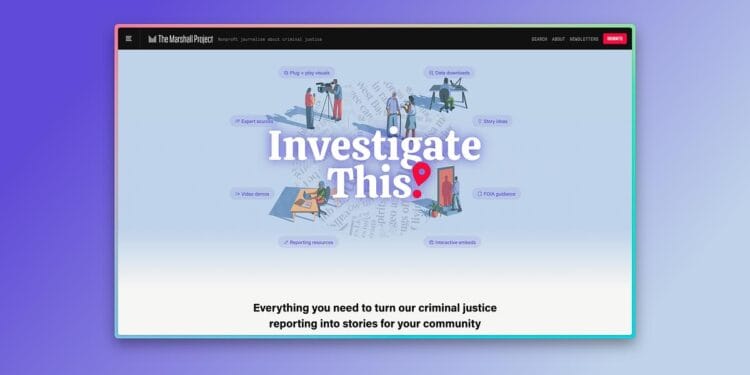The Marshall Project is launching a new initiative called Investigate This! to empower criminal justice journalism in local communities. We want to connect journalists and other newsrooms with resources and data to help with their creation of strong, original stories that have the potential for significant local impact.
Our team of reporters and editors has created story toolkits filled with reporting resources, data downloads, multimedia assets, shareable illustrations, FOIA guidance, expert sources, style guidance, and more. Each toolkit will include a live webinar and video demos to surface insights into the nuances and opportunities around covering the criminal justice system, incarcerated people and their loved ones.
Investigate This! is launching with toolkits that can help local newsrooms examine:
Sharing our work has always been a guiding principle of The Marshall Project. We have partnered with hundreds of media outlets since our founding a decade ago. Investigate This! builds on that philosophy, and our experience localizing national datasets on FBI crime statistics, American Rescue Plan Act funding, and books banned in prisons. These reporting resources are designed to be useful for all journalistic mediums, and Investigate This! will also pilot audio content, including spots for newscasts, which will be shared with local radio stations.
“We are building this collection of datasets and reporting guides for local newsrooms to save them time, so they can focus on digging into the criminal justice trends and issues impacting their communities,” said Michelle Billman, partnership and engagement associate for The Marshall Project who is helping to lead Investigate This!.
Alongside the toolkits, The Marshall Project is building out a robust resource center for journalists covering criminal justice, which will include style guidance on using people-first language when reporting on incarceration. One overarching goal is to help newsrooms regularly incorporate the voices of people in prison or who were formerly incarcerated, along with their friends and family members. There will also be templates for public records requests and tips from our reporters on how to track down the people most familiar with the system’s inner workings, including background experts who can contextualize complex data.
Ahead of the national election, we plan to release new toolkits on analyzing FBI crime data to combat election disinformation and localizing the results of our political survey of more than 30,000 incarcerated people across the country. Beyond that, The Marshall Project will be regularly releasing new toolkits. We’re also building a collection of videos and articles on the style, standards, and sourcing considerations we make while covering the criminal justice beat.
The project is overseen by a team with deep experience in local news, community engagement reporting, data journalism, and media partnerships. Michelle Billman is the primary lead for Investigate This!. She is a former public radio news director, who managed small local newsrooms with limited resources for more than a decade.
Ruth Baldwin is our editorial director and her experience creating and overseeing The Marshall Project’s partnership strategy helped conceive of and inform Investigate This!. David Eads, our data editor, led key contributions from data team members Weihua Li and Andrew Rodriguez Calderón, as well as product manager Ana Graciela Méndez. Their experiments in generative journalism highlighted the potential of this effort.
Nicole Lewis, our engagement editor who oversees The Marshall Project’s national and local engagement reporting initiatives, works to ensure our reporting is resonant and accessible to people most affected by the justice system. Elan Ullendorff created the visual framework for Investigate This!. Aithne Feay, Gabe Isman and Ryan Murphy built the web experience. Ghazala Irshad, our style and standards editor, provided language and framing guidance, and our senior editor for storytelling, Raghuram Vadarevu, oversaw the creation of the visual assets for each toolkit.
To learn more about Investigative This! Please reach out to Michelle Billman at [email protected].



























